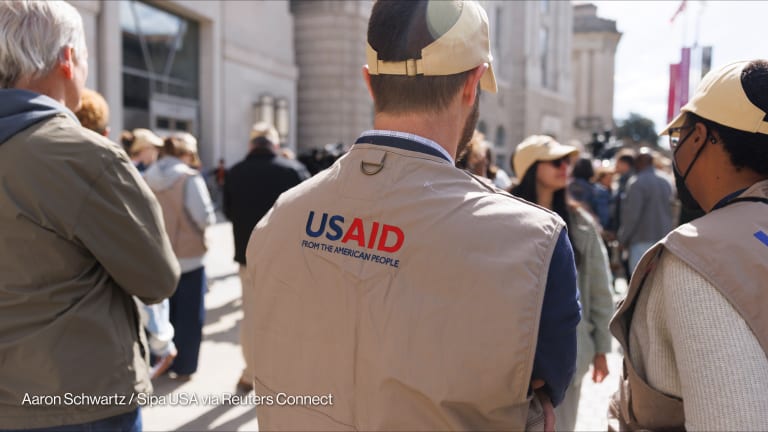
A court order has done little to dissuade the Trump administration from moving ahead with its plan to nix grants and contracts it deems to be against national interest.
Also in today’s edition: The various legal showdowns are gaining steam. We break down what each means.
+ Join us and a panel of sector leaders on Monday, Feb. 24, for a discussion on what to do if you’ve lost your NGO job. This is a free event designed especially for those directly affected by recent changes to gain insights and guidance on the next practical steps to take. Save your spot now.
Contract killing
The victory was short-lived. After a judge ordered the Trump administration to unfreeze existing aid programs and get money flowing again to USAID partners, the government bit back, stating it is within its rights to terminate hundreds of agreements, in addition to reviewing payments line by line for fraud, waste, or abuse. It means funding won’t likely be restored to most organizations anytime soon, if ever.
This is a preview of Newswire
Sign up to this newsletter for an inside look at the biggest stories in global development, in your inbox daily.
In court documents filed yesterday, the administration said the temporary restraining order that lifted the blanket freeze on foreign aid funds also said that normal contract clauses can be enforced — an argument the government has latched on to terminate nearly 500 USAID grants, contracts, and other awards since Jan. 22.
“Following its review process and consistent with the terms and conditions of the relevant instruments, USAID intends to terminate instruments that [Secretary of State Marco Rubio] determines are inconsistent with the national interests of USAID’s mission,” Peter Marocco, acting USAID deputy administrator, wrote in a recently filed court declaration.
Marocco explained that contracts were terminated for a variety of reasons, including that they focused on diversity, equity, and inclusion; sustainability and climate change; and regime change, civic society, or democracy promotion.
Moreover, the government is embarking on a review of all agreements for waste, fraud, or abuse, which is likely to further drag out the payment process.
During a recent Devex Pro briefing, lawyer Robert Nichols predicted the government would refuse to pay its bills based on Marocco’s assertions.
“When they deem the whole agency and its implementing partners criminals, and say this is all fraud and waste, they’re teeing up the ability to not pay the bills and to have some argument that even if court says you have to pay your bills, they say, ‘Well, we’re paying them. We’re just making sure there’s no fraud and waste in there first,’” Nichols said.
After the government filed its rebuttal, the plaintiffs — including for-profit contractors and NGOs — promptly filed an emergency motion to enforce the temporary restraining order and hold the government in civil contempt.
“The report makes the remarkable assertion that Defendants have reviewed thousands of affected State Department and USAID grants, contracts, and cooperative agreements, and concludes that — despite this Court’s unambiguous order — terminating nearly all foreign assistance funding was legal,” states their document.
Read: USAID contracts and grants still being terminated despite court order
ICYMI: Will USAID partners get paid? The verdict is still out (Pro)
+ Not yet a Devex Pro member? Start your 15-day free trial now to access the event as well as all our expert analyses, insider insights, funding data, and more. Check out all the exclusive content and events available to you.
Out in the cold
The tit-for-tat is just one of several legal counteroffensives being mounted against the administration’s targeting of USAID.
If you recall, on Feb. 13, a judge barred the administration from placing thousands of USAID employees on administrative leave. But that only applied to direct hires. Now, personal service contractors, or PSCs, many of whom were among the first to lose their jobs weeks ago, are looking to the courts to be reinstated and reimbursed for back pay, my colleague Elissa Miolene writes.
“While direct-hire employees have been placed on administrative leave, [personal service contractors] have in many cases received no information about their status, while finding themselves cut off from all USAID computer networks and locked out of USAID headquarters,” the complaint states, noting that PSCs in hot spots such as Ukraine and Somalia have lost access to safety communication channels.
The lawsuit also argues that the administration’s foreign aid freeze — and the resulting dismantling of USAID — is illegal.
“The Defendants’ aim is not to pause foreign aid,” states the complaint. “It is to devastate and eliminate it and the federal agencies, employees, and contractors who provide it.”
The Feb. 13 ruling also contested Marocco’s order that direct hires posted abroad be recalled in 30 days, granting those employees a temporary reprieve. Now, in a follow-up hearing yesterday, the judge said the Trump administration had created a “mess” for the overseas employees after conflicting statements made by Marocco, and he ordered the Justice Department to submit a new declaration by noon today clarifying its position on overseas employees, according to Politico.
Filings in this case include testimonies of a denial of a medical evacuation for a risky pregnancy, unpaid bills for security measures for buildings the U.S. government uses abroad, and failure to provide standard logistical and financial support to American staff as they evacuated the Democratic Republic of Congo amid a deteriorating security situation.
“These uncertainties, combined with the chaotic implementation of the evacuation of USAID staff in foreign countries, is harming USAID employees and their families,” wrote Randall Chester, USAID vice president of the American Foreign Service Association, in a declaration submitted to the courts.
Read: Lawsuit seeks to reinstate USAID contractors, claiming irreparable harm
Read: Court filings underscore security risks to USAID staff abroad
ICYMI: Judge extends reprieve for USAID employees in union lawsuit
+ Devex is officially on Telegram, WhatsApp, and Bluesky! We’ll be sharing news, events, and more on these platforms. Follow us to get updates directly on your mobile devices!
Musk in the mix
Last but not least, an anonymous group of USAID employees and contractors are suing the billionaire spearheading the administration’s sweeping efforts to ax government spending.
Twenty-six former and current USAID employees have filed a lawsuit against Elon Musk, head of the Department of Government Efficiency, or DOGE, arguing that he has decimated USAID without the authority to do so.
“The scope and reach of his executive authority appears unprecedented in U.S. history,” states the initial complaint, filed in Maryland.
The lawsuit alleges that Musk and DOGE have subverted the U.S. Congress by acting without a formal appointment or congressional nomination, along with operating “beyond the bounds of any proper executive power.”
It also lodges specific accusations, including that after decades of work with the agency, USAID employees were locked out of their systems while DOGE staff were allowed in, Elissa writes.
It notes the DOGE team had access to the agency’s classified systems without the required security clearances, with one staff member stating DOGE staff gained the ability to “see every email, delete, and send email on behalf of every user within USAID.”
Privacy concerns surrounding DOGE’s efficiency campaign were also raised in the lawsuit brought by private service contractors after DOGE published their personal details online.
Read: Anonymous USAID employees, contractors sue Musk, DOGE
National insecurity
The Trump administration has partly justified the aid freeze as a way to ensure that programs are aligned with America’s interests. But critics say it is having the opposite effect, threatening America’s national security interests by giving terrorist organizations a vacuum in which to recruit and regroup.
My colleague Jesse Chase-Lubitz writes about the role climate plays in this nexus, citing the example of central Somalia, where a water infrastructure initiative known as the Jowhar Offstream Storage Project, or JOSP — partially funded by USAID — was expected to bring food security to more than 1.65 million people before it was put on hold.
The area is home to al-Shabab, an al-Qaida-linked militant group that finds particular success recruiting from farming and pastoralist communities that have been struck by drought or floods.
“Somali food security is also Somali national security,” says Adam Omar, JOSP’s project manager. “It’s ironic that despite the justification for the aid freeze being tied to U.S. security, that ultimately it might impact U.S. national security interests in a negative way.”
Studies have shown that terrorist activity thrives in areas hit hard by climate change. In 2019, Congress passed the Global Fragility Act, or GFA, which is designed to improve U.S. efforts to prevent violent conflict and stabilize fragile states. GFA directs the U.S. State Department to develop 10-year plans for specific conflict-affected countries, Somalia included.
“There has been bipartisan agreement on Capitol Hill for these programs because they cost a lot less than dealing with conflict and instability down the line,” says Erin Sikorsky, director of the Center for Climate and Security, cautioning that, “If the U.S. isn't there to help with those challenges, that gives an opening for extremist groups.”
Read: As aid dries up, experts warn that extremism will rise
Related: Chaos, staff cuts have ‘degraded’ USAID's ability to vet terrorist ties
See also: How the collapse of USAID could unleash ‘an ISIS army in waiting’
+ Explore our dedicated page for all the latest news, in-depth analysis, and exclusive insights on how the Trump administration’s policies are reshaping global development.
In other news
The European Commission has unveiled a road map for agriculture and food policy through 2040, with a renewed commitment to sustainability goals. [Politico]
Russia’s full-scale invasion of Ukraine has internally displaced over 1.8 million women, while nearly 6.7 million require humanitarian assistance, according to UN Women. [UN News]
Vietnam has approved an $8.3 billion railway project through a concessional loan from China, as the Southeast Asian country seeks to boost connectivity and economic growth. [VOA]
Sign up to Newswire for an inside look at the biggest stories in global development.








